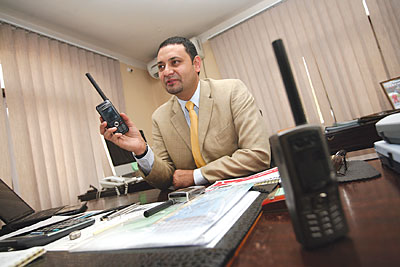 KIRAN PANDAY DIAL-A-SATELLITE: Anudan Rana of Constellation shows customers how a Thuraya satellite phone can be useful in an emergency. |
When Anudan Jung Rana started selling satellite phones in Nepal in 2003, the war was going on and demand was high. His Thuraya sets were flying off the shelves.
The mobile phone network wasn't as widespread as it is now, so there was heavy demand. In the jungles the Maoists were using ACeS satellite phones with SIM cards smuggled in from Thailand and the Philippines.
In the past four years, Rana has seen a shift in his customer base. Relief agencies all have satellite phones because of security, and mountaineering expeditions have started buying or renting phones here.
But in the last few months since the Haiti and Chile earthquakes, international aid agencies and even businesses in Kathmandu have started buying satellite phones to prepare for a possible post-earthquake communication blackout.
Rana was spooked by the devastation in Port-au-Prince, and he is one of few Nepalis with a tin trunk in his backyard stocked with digging equipment, clothes, tents, dry foods and water-purifying tablets to last three weeks. And a satellite phone. He plans to have another standby pack in the trunk of his car at all times.
"When there is an 8 magnitude earthquake, all communications will be out. How are we going to get word to the outside world, how will we communicate and coordinate rescue and relief?" asks Rana.
Dubai-based Thuraya has two geo-synchronous satellites covering the Indian Ocean, but extended its reach up to Australia after the 2004 tsunami. Iridium is based on low-orbit satellites with worldwide reach, and has a special department to help relief and recovery efforts during natural disasters.
Satellite phones can also be handy for mountaineers who are lost, stranded or have had accidents. A trekker on his way to Mansarovar who broke his leg in Humla two years ago called in a rescue helicopter with his Thuraya set, and was able to give his exact location because of a GPS on his phone.
It's not just for natural disasters and accidents that satellite phones come in handy. Political crises like Gyanendra's 2005 coup also saw strong demand for satellite phones once all landlines and mobile phone lines, internet services and news channels on radio and TV were cut. Besides the UN and the embassies, it was only Rana's Constellation company office in Jhamsikhel that had links to the outside world during this unprecedented communication blackout.
"It was like a rehearsal for a catastrophic earthquake," says Rana, adding, "we offered short calls for family emergencies for free."
Satellite phone companies like Thuraya now offer sim cards that can function as a normal GSM roaming when plugged into a cell phone, which helps the user keep it operational and topped up. Thuraya and Iridium also
sell data communication antennae for customers who want to be online when ISPs break down.
Satellite phones appear to sell best in countries prone to natural disaster and political instability. Which must be why they are in such high demand in Nepal.
Kunda Dixit
PHONE BILLS
Thuraya pre-pay has a flat rate of $1.49 per call except for hard-to-reach destinations. The post-pay calling rate is $1.34. Thuraya to Thuraya calls are $0.90 a minute. Thuraya also offers special sims for 80 developing countries, including Nepal, where the calling rate is $0.75.
www.thuraya.com
Iridium's standard offer is a $70.99 monthly fee with 20 minutes free and $1.29 for every additional minute. The annual fee is $499.
www.iridium.com


